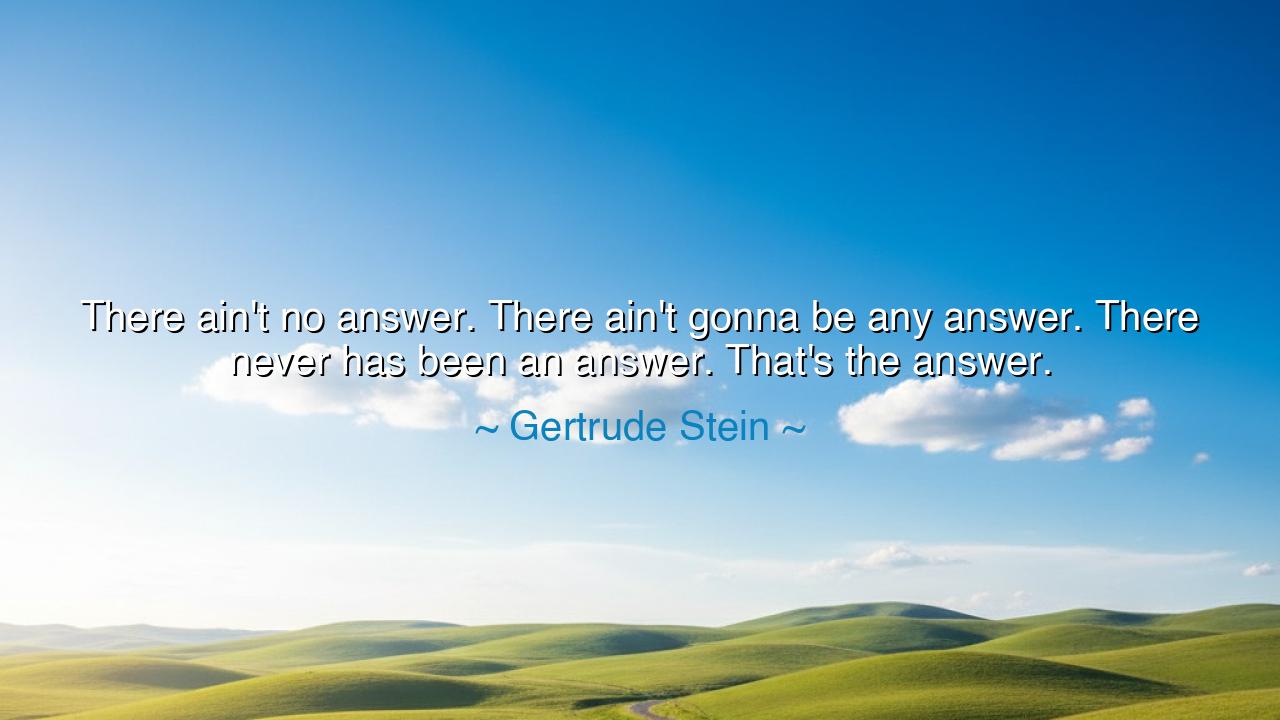
There ain't no answer. There ain't gonna be any answer. There
There ain't no answer. There ain't gonna be any answer. There never has been an answer. That's the answer.






The words of Gertrude Stein, “There ain’t no answer. There ain’t gonna be any answer. There never has been an answer. That’s the answer,” resound with the paradox of wisdom. They reveal the eternal truth that life’s greatest mysteries cannot be solved by reason alone, nor reduced to tidy conclusions. In her voice, there is both resignation and liberation: the recognition that to seek a final answer to existence, love, or meaning is to chase the horizon. The search is endless, and in that endlessness lies the truth itself.
The ancients knew this well. Philosophers wrestled with the riddles of the cosmos, the gods, and the soul. Yet again and again, they found that each answer led to deeper questions. Socrates himself, called the wisest of men, confessed that his wisdom was knowing he knew nothing. Stein echoes this same eternal insight: the quest for certainty is futile, for the world is woven not from fixed truths, but from mystery, change, and becoming.
Consider the story of the Buddha, who sought enlightenment by asking why suffering exists. For years, he searched for the answer in ritual, fasting, and asceticism, but none sufficed. At last, under the Bodhi tree, he realized the truth: the answer was not a single word or formula, but the acceptance of impermanence, the practice of compassion, and the walking of the middle path. His wisdom was not in finding an ultimate solution, but in seeing that no such fixed solution exists.
Stein’s words are not despair but freedom. If there is no final answer, then life itself becomes the answer. The burden of certainty is lifted, and one is free to live, to create, to love, without waiting for the universe to hand down a decree. Her teaching calls us to dwell in the present, to embrace the unknown, and to see that mystery is not emptiness, but abundance.
So let this truth endure: do not wait for the perfect answer, for it will never come. Instead, live as though the question itself is sacred. For in the asking, in the journey, in the endless unfolding of experience, we touch the divine. Stein’s wisdom is the wisdom of the ages: that the absence of an answer is itself the greatest answer.






TM12.Dao Truong Tra My
What strikes me about Stein’s quote is its almost philosophical acceptance of life’s unanswered questions. Does this mean that seeking answers is inherently flawed, or is Stein simply accepting that some things are beyond human understanding? Could this viewpoint help us shift our focus from finding answers to appreciating the complexity and ambiguity of life?
NVLe Thai Ngoc Van
Stein’s quote feels like a commentary on the futility of expecting life to provide clear-cut answers. It’s as though she’s telling us that life’s mysteries will always remain unsolved. But can this perspective be empowering? By acknowledging that no answer exists, does it free us to live more fully, without the pressure of finding the ultimate truth or solution to every problem?
GDGold D.dragon
This quote from Stein seems to challenge the very concept of resolution or certainty in life. Is it liberating to think that there is no final answer to our existential questions? Or does it feel unsettling, like the lack of answers implies hopelessness? Maybe it’s a reminder that the search for meaning itself is as valuable as any conclusion we might come to.
TPHuynh Tan Phat
Gertrude Stein's quote seems to suggest that there is no definitive answer to life’s biggest questions. It’s almost as if she’s acknowledging the uncertainty and complexity of existence. But does this mean we should stop seeking answers altogether, or does it encourage us to embrace the journey rather than the destination? Can there be peace in accepting that some questions may never have clear answers?